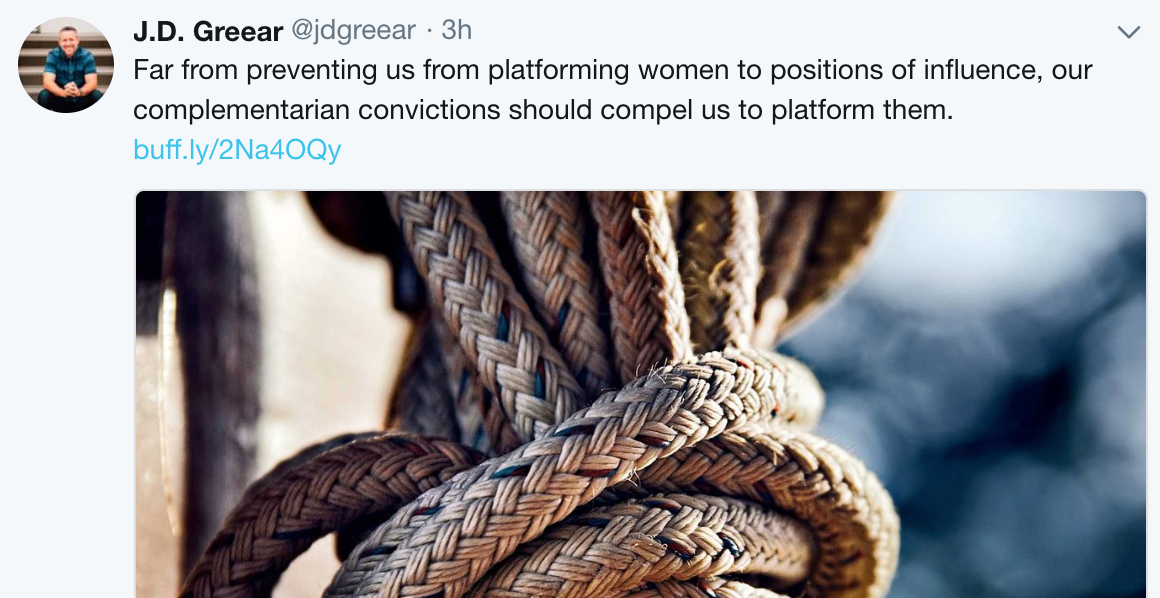What on Earth is happening? Why are all of these evangelical leaders pushing feminism and Egalitarianism from their social media accounts, and why does it seem so coordinated? Like a wave, from Danny Akin to JD Greear to The Gospel Coalition, these same evangelical individuals and groups that once lauded the Council on Biblical Manhood and Woman are now promoting female pastors, female denominational leaders, female deacons, female pastoral degree seminarians, and female preachers. Everybody panic. No, really.
Let us help you understand what’s happening. The Social Justice influence upon evangelicalism, which is in part influenced by the globalist cash from leftist donors that includes (but is not limited to) George Soros and James Riady (type their names in the P&P search bar for all the primary sources about their financial contributions to New Calvinist institutions), is driven by Cultural Marxism. Cultural Marxism – similar, but not quite synonymous to Identity Politics – seeks to lead individuals to see themselves by “identity groups” of minority status; gender minority, racial minority, underprivileged or victim minorities, sexual minority, and so on. The hope of Cultural Marxists is that these various minority identity groups will then coalesce into a solidified movement or informal union, which will overthrow the established social order. It’s like how economic Marxism sought to empower the proletariat against the bourgeois, but this kind is for feminists, perpetual victims and trannies.
With MLK50 behind us, these same Cultural Marxists and their merry band of useful idiots (willing, but unknowing accomplices), are now rising up two other minority identities within the church; sexual minorities and underprivileged women. Concerning the former, most are aware by now of the Revoice conference, which is finally (but belatedly) receiving some negative publicity inside evangelicalism. Concerning the latter, few have yet caught on that there is a coordinated effort to promote a type and kind of feminism that hasn’t been seen before in conservative evangelicalism since the mainstream denominations were scuttled into irrelevancy by it in the middle of the twentieth century. These Social Justice neophytes think they’re onto something novel with their “new ways” of looking at gender roles in the church. In reality, it’s only new in their lifetime. It’s all been said and done before, except back then it was called liberalism.
What’s most astounding for many of us isn’t that skinny jeans-wearing steroid pastors in the Latte Mafia are promoting egalitarianism. Heck, we would expect it if for no other reason than the price they pay for a haircut. In fact, it would be hard to believe that these hard-rocking, soft-preaching children of the age wouldn’t embrace lady preachers. What’s astounding – and agonizing – for the rest of us in conservative evangelicalism is that they’re embracing egalitarianism in the name of complementarianism. And that’s a sick and word-twisted way of doing business.
In Douglas Wilson’s brilliant article today entitled, On the PCA Getting French-Kissed By the World, he begins by writing, “I have argued for some years that the battle of our day is a battle for the control of the dictionary. What shall we call things? More importantly, what shall we not be allowed to call things? And the two great questions of philosophy are involved—why and who says?”
Wilson is absolutely right. He continues his analysis, and although Wilson speaks of the Evangelical Cultural Marxist dalliance with sodomy, it applies to its dance with egalitarianism as well.
Wilson writes, “I just made mention of the ‘old days,’ which would be, in Reformed evangelical circles, about six months ago, and even earlier.”
Indeed, questions about what complementarianism is and how it should be defined were settled eons ago. How quickly things change.
Of course, JD Greear’s comment makes absolutely no sense if the definition of complementarianism isn’t as fluid as Bruce Jenner’s gender. Complementarianism does not seek to “platform” women. The platform is for preaching. The platform is for authority and leadership. That’s egalitarianism, straight-up, hard-core, stone-cold. Greear is just calling it complementarianism, and everyone is nodding their head as though he’s just discovered some previously unthought-out aspect of the doctrine.
I’m here to tell you that this emperor is naked. That’s egalitarianism.
There’s another name for it, however. It’s called “Complementarian Feminism.” Again, the name is also egalitarianism; the terms are synonymous.
Unlike most polemics terms, however, I didn’t invent it. In fact, I don’t know who did. One of our admins discovered the post, somewhere in a long-forgotten corner of the Internet, covered in cyber-dust. Whoever wrote it shows easily six-times the prophetic prowess as anyone who writes for Charisma Mag. It caught my attention because I ran across an article this morning from Mary Kassian (who he discusses in the post) at The Social Gospel Coalition from 2012 which absolutely butchered the definition of complementarianism. When I saw that someone was on to this two years ago, I just had to share it with you.
Complementarian Feminism
I’ve been writing this week about complementarian (covert) feminist Mary Kassian, a Women’s Studies professor at the Southern Baptist Theological Seminary. Kassian is a council member of the CBMW and was involved with its founding. She also contributes fairly regularly to The Gospel Coalition (TGC), another flagship complementarian organization. But Kassian is the old guard of complementarian feminists. I don’t say this to minimize her work in bringing feminism to Christianity. She has worked tirelessly for decades in this regard, and she has had great success. I suspect we can even give her at least partial credit for convincing the CBMW to invent the feminist sin of servility in their founding document. But Kassian’s work has been mostly about consolidating the gains overt Christian feminists made in the 60s, 70s, and 80s, and nurturing these ideas in complementarianism. She has also of course trained up the new guard of complementarian feminists in her role as a Women’s Studies professor.
But the old guard paves the way for the new guard, and the new guard of complementarian feminists are women like Jen Wilkin. While Kassian periodically contributes to TGC, Wilkin is a formal contributor at TGC and also publishes books under their banner. Wilkin is also a minister working for Pastor Matt Chandler, President of the Acts 29 network.
As a member of the old guard, Kassian is careful to distance herself from the label feminist and focuses on undermining headship and stoking feminist resentment. But because of the progress women like Kassian have made over the decades, a new guard of complementarian women like Wilkin can afford to be quite open in their feminism (even if they avoid outright calling themselves feminist) and focus on the same issues as secular feminists. As the old guard stomps out the last embers of complementarian headship and submission, the new guard can focus on agitating for affirmative action for women in leadership roles.
For example, in let not the men keep silent* Wilkin repurposes a viral feminist letter by a white knight complaining about supposed barriers to women in engineering. She very openly applies secular feminist activism in her role as a complementarian (emphasis mine):
Jared understands what I wish more men in ministry understood. In the ongoing discussion about whether women in complementarian churches are actually treated with the equal value that Genesis 1 bestows on them, it is time for men to speak up on behalf of their sisters. We women can tell our shared stories to whomever may listen, but our concerns won’t likely draw notice until our brothers perceive their validity, take them to heart, and speak them as their own. As long as women are the ones speaking them, we are easy to dismiss as complainers or (gasp) feminists.
Jared Mauldin had eyes to see the stereotypes and gender bias that plague women who venture into fields where “they don’t belong”. What he observed plays out in its own ways in churches, as well. Church staffs, like most male-heavy environments, often unwittingly perpetuate boy’s club mentalities, harmful gender stereotypes and tokenism. I and other women have occasionally donned protective gear and written on it.
In More Pressing than Women Preachers, Wilkin explains that she isn’t focused on convincing fellow complementarians to accept women preachers because she is too busy pushing for more women into every other leadership role in the church:
Once again the internet has been abuzz with discussions of whether women should preach in the local church gathering. Whenever the issue is raised, those who oppose it are quick to explain that the role is not withheld from women because they are less valuable than men. And that “equal value” assertion always shifts my eyes from the pulpit to a more pressing concern. As some continue to debate the presence of women in the pulpit, we must not miss this immediate problem: the marked absence of women in areas of church leadership that are open to them.
The women e-mailing me regularly are not worried about winning the pulpit. They’re still facing opposition over teaching the Bible to other women. They are fighting to be seen as necessary beyond children’s ministry and women’s ministry. They are fighting to contribute more than hospitality or a soft voice on the praise team. They are looking for leadership trajectories for women in the local church and finding virtually nothing. They watch their brothers receive advocacy and wonder who will invite them and equip them to lead well. If the contributions of women are equally valued in the church, shouldn’t we see some indication in the way we staff?…
…The sisters among us are wondering when we’ll be able to tangibly demonstrate equal value in the local church, not just affirm this value with our words.
Elsewhere Wilkin explains the need for complementarian pastors to not permit women to take on leadership roles, but to pursue them for leadership roles. In The Complementarian Woman: Permitted or Pursued? Wilkin explains that the Apostle Paul set a disturbing tone among Christians that needs to be corrected:
I am not certain when it became common to speak of permitting rather than pursuing women to serve, but I admit that it grieves me. Yes, there is that well-worn verse in 1 Timothy, but it seems a shame to let one occurrence of a term dominate our language and practice. It may be that permission vocabulary persists because of the unfortunate woman-as-usurper stereotype that sometimes underlies complementarian thought.
She suggests that if there was more affirmative action for women in leadership, Christian feminists might stop rebelling:
I have to think that egalitarians would grow quieter in their critiques if we could point to more women within our ranks who convincingly demonstrate equal, complementary value in our churches.
Feminist progress is after all a reflection of men having the courage to lead:
Do you desire to leverage the equal complementary value of women in your church? Don’t give us a chance to ask permission. Get out ahead of us. You approach us with what you intend to empower us to do. End the culture of permission and you will dispel the stigma of submission. We are not usurpers, we are the possessors of every capacity you lack and the celebrators of every capacity you possess.
Brothers, don’t permit us. Pursue us.
Of course, Wilkin has also been active in recent months, and has been promoted by the Social Justice contingent in evangelicalism. What you’ve seen from SBC Voices, The Gospel Coalition, Greear, Akin et al, isn’t complementarianism (no matter whether they call it that or not). It is Complimentarian Feminism, whether they like it or not.
And the other name for that is…Egalitarianism.












